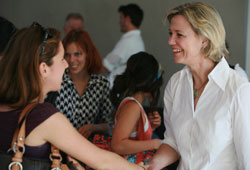The next president of the United States must conduct a rigorous inventory of post-9/11 counterterrorism initiatives to determine whether they're effective and worthwhile.
That was the message delivered Friday by UCSC alumna Dana Priest, a two-time Pulitzer Prize-winning reporter for the Washington Post. Priest (B.A. politics, 1981, Merrill College) was on campus to accept the 2008 Alumni Achievement Award at the Founders Day celebration Friday evening. Earlier in the day, she gave a lunch-hour talk about the national security issues that will face the next president.
Priest urged the next president, whether it's Barack Obama or John McCain, to scrutinize defense and intelligence programs to determine whether they "make us safer and promote the democratic values that support and enhance the U.S. way of life."
"No one has had the nerve, the guts to take that issue on," said Priest, conceding that it's "still so easy to call somebody weak on terrorism and frighten them out of doing what I call basic accountability."
Priest, who won a second Pulitzer Prize for her 2007 exposé of the deplorable conditions facing wounded soldiers at the Walter Reed Army Medical Center, said the next president owes it to future soldiers to "try to make war the last solution."
Numerous major, costly initiatives launched since 9/11 warrant scrutiny, said Priest, including the Department of Homeland Security and the Director of National Intelligence, as well as secret programs such as the CIA's "black site" prisons, which Priest exposed in work that earned her her first Pulitzer Prize.
The next president must ask if these initiatives and many more have "really gotten us what we want," urged Priest.
"Are we spending money for something we don't need?" Priest asked of government operations designed to fight domestic terrorism.
If the terrorist threat doesn't warrant all of the spending, then one of the biggest issues facing the next administration will be trying to reign in the bureaucracies, said Priest.
That effort would surely to be complicated by the forces of popular public opinion, as well as by the influence of lobbyists representing what Priest referred to as the "industry that has grown up" around national security needs.
But a "serious lack of oversight" on the part of the executive branch and Congress must be reversed, she said. "The agencies that are involved have learned very clever ways to keep [government overseers] at bay," said Priest.
Referring to recent court rulings that have chipped away at the Bush administration's interpretation of executive authority, specifically regarding Guantanamo Bay prisoners, Priest noted that "they haven't voluntarily given up anything."
Similarly, although the CIA's secret prisons are "to the best of my knowledge currently on hold," Priest said the government has not disbanded the program. Rather, prisoners have been moved to facilities run by host nations such as Afghanistan, Pakistan, Jordan, and Tunisia, where U.S. intelligence personnel operate, she said. "They've been suspended but they're not dead," she said. "They've been diverted into another form."
A major consequence of the Bush administration's focus on military solutions to the terrorist threat is that the diplomatic corps now functions as a "shadow military corps," said Priest. "We need a big shift in how diplomats think about their jobs. We need to empower and reinvigorate the State Department and the nonmilitary actors in government."
As a journalist, Priest remains nonpartisan, but she said Obama and McCain have very different ideas about international engagement. If Obama is elected, much of the world will "forgive the U.S. unilateralism that has caused so much grief around the world," she said.



